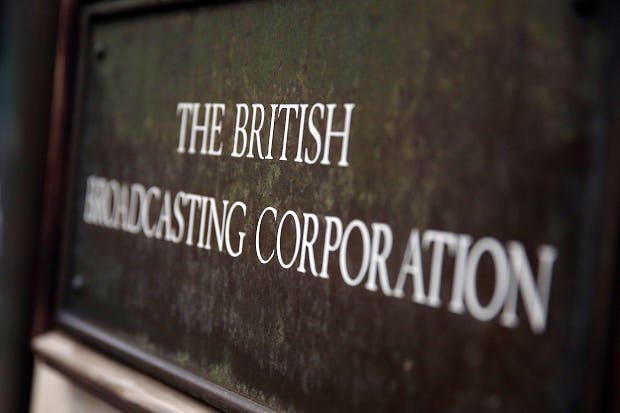The BBC is our other national religion and like the NHS it inspires a devotional intensity that can be a little creepy. The disclosure of star salaries over £150,000 certainly brought out the worst in the Corporation’s self-styled defenders. Their argument could have been designed to annoy: market dogmatists wanted to destroy the BBC because it’s too successful, they say. But not so successful that it could survive without the Licence Fee – which by the way isn’t a tax and at £147 is actually great value for money. If anything, we should be grateful the BBC deigns to broadcast to us. Anyway, this was just the wicked press attacking a commercial and political rival, runs their argument – while still dismissing as slander the idea that the BBC involves itself in commerce or politics.
Like the Laodiceans, you must be either hot or cold on the Corporation; ambivalence will not be tolerated. And yet by any sensible assessment, the Beeb invites a lukewarm response. What it does well, it does better than any broadcaster in the world. Its news and current affairs output is eclectic, comprehensive and informative. In John Humphrys, Eddie Mair, and Andrew Neil the Beeb boasts the three toughest broadcast interviewers in the English language. Many of the best dramas of the past decade — The Fall, Happy Valley, Line of Duty, the Night Manager — have reached us via the BBC. And at moments of national triumph or catastrophe, it is the reassuring voice of British resolve and self-deprecating celebration.
And yes, it annoys. In BBCland, immigration is Congolese restaurants and cheap nannies, not bulging classrooms and community tensions. The LGBT debate is no debate at all; anyone who dissents is a bigot and a Jesus freak. Refugees are all genuine and everyone who lives outside London is probably racist. Islam is a religion of peace and Brexiteers incipient domestic terrorists. Its voice may no longer toll in crisp RP tones but it is still predominantly middle class, graduate, and southern. It is the voice of a monolith that demands money with menaces from the poor and non-conforming. It is gratingly aloof, unresponsive to its coerced customers, and hostile to all criticism except the theatrical and self-justifying auto-flagellation in which it occasionally engages.
But when you consider the merit of maintaining a public service broadcaster in 2017 you appreciate that not only is the BBC still worthwhile, it is more necessary than ever. Crucially, it’s a force for unity in a Britain divided by identity and fractured by devolution: a Glasgow University study once found that Eastenders was watched so much in the city that a cockney accent had started to seep into the streets. When the SNP sought to tear up the United Kingdom, it dedicated much of its energy to demonising the BBC as a rival source of identity and loyalty for Scots. The BBC’s soft power matters as much at home as abroad. The SNP obsesses about getting rid of the BBC’s UK-wide 6pm news because it gives lie to the nationalist fiction that people across this country are irreconcilably different. A national news broadcast confirms our shared concerns and priorities
Globalisation and technology allow us to cross physical and digital barriers millions of times a day but the BBC is a stubborn reminder of common ties and shared values. It is a silent rejoinder to the Prime Minister’s philosophy, a platform where we can be citizens of the world and citizens of somewhere at the same time.
The rise of fake news and the ascendancy of Trump and Corbyn make the BBC all the more needed. Liberal societies can endure many trials but not the absence of universal facts. A polity of competing truths, in which reality is relative and entirely subjective, is a post-modernist’s dream but a democrat’s nightmare. Donald Trump’s electoral victory relied heavily on fraudulent social media memes while Jeremy Corbyn managed to convince 40 percent of the nation either that his entire past was an invention of the mainstream media or happily irrelevant to his pursuit of power. Without a commonly-agreed set of facts and a referee to uphold them Trump winning the popular vote and Corbyn advancing peace in Ulster become alternative truths — plausible, perhaps preferable.
There is a reason the BBC is despised by the Kremlin and the SNP, Middle Eastern autocrats and the Stalinist left. When the absolute boys of Corbyn’s Labour get their hate on, they largely ignore Faisal Islam, Robert Peston and Gary Gibbon and direct their obsessive paranoia at Laura Kuenssberg. In part, this is because she’s a woman and in part because her name ends in ‘berg’ but mostly it’s because she asks awkward questions and breaks unhelpful stories — she has a talent for both. When a thug regime starts rounding up opponents, one of the first things it does is kick out the local BBC presence.
In the end, the BBC is neither straightforwardly Left nor Right. It is a taxpayer-funded national educator staffed by the London intelligentsia — a social democrat’s reverie. It is also a conservative institution, entrenching tradition, maintaining continuity and lending reverential pomp to the monarchy, the church, and Parliament. Our times are afflicted at once by popular cynicism and idealism run amok. The BBC, itself an alloy of the two, is a bulwark against both.







Comments